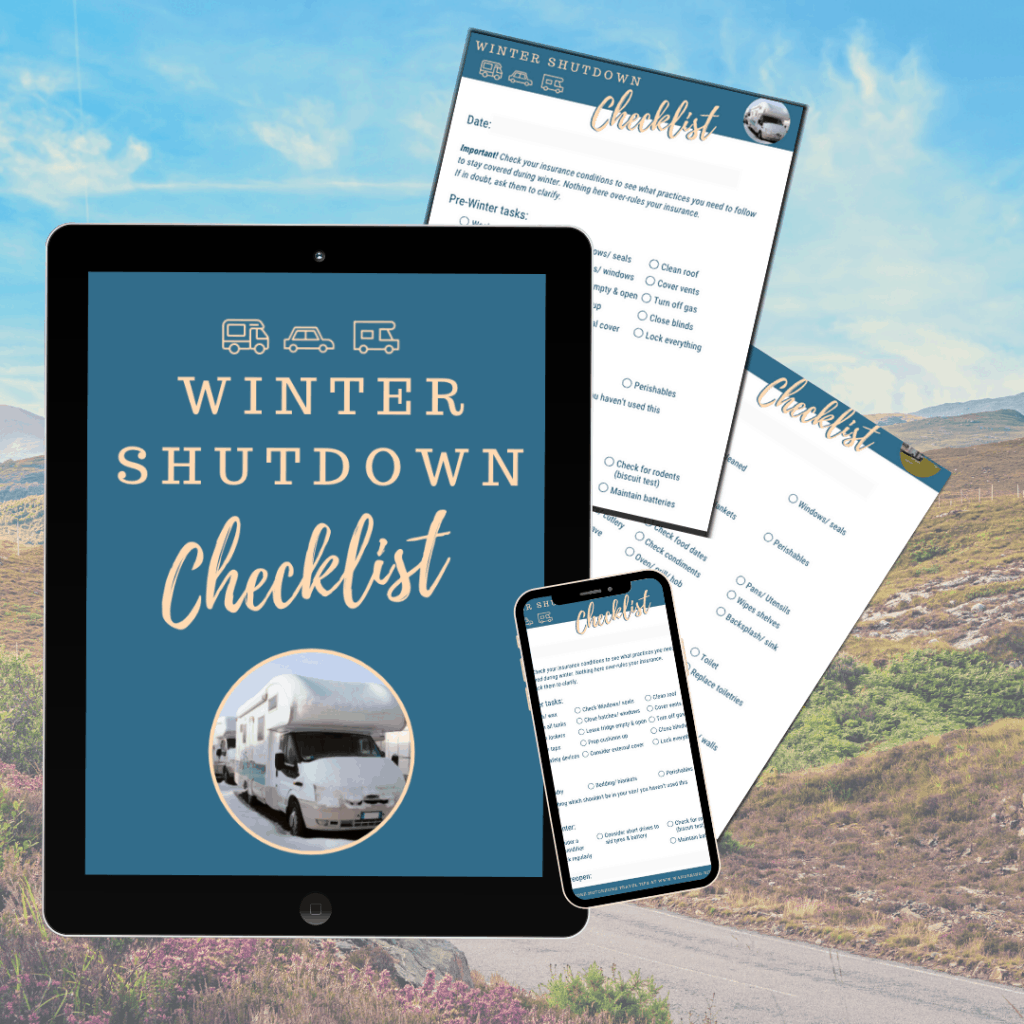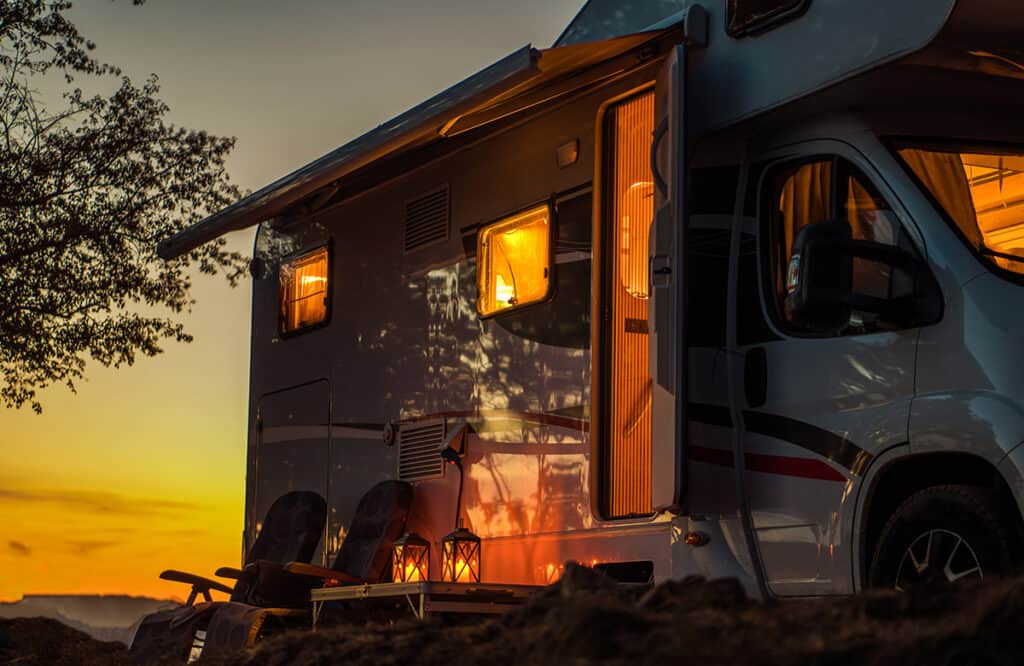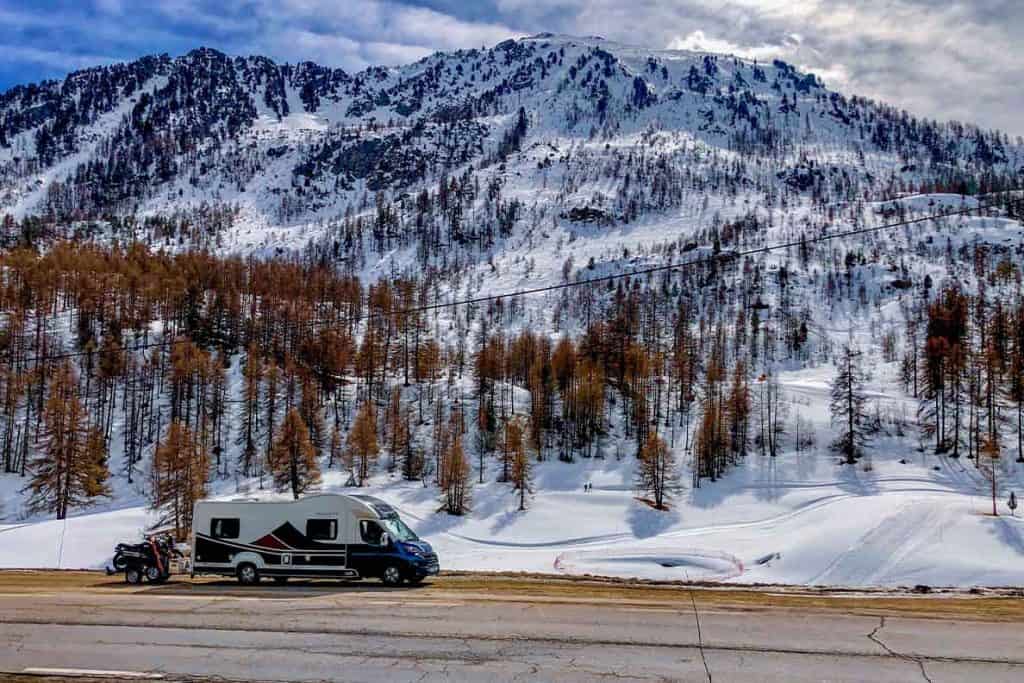Want to use your motorhome or camper all year, including winter? Need to stay warm on the road in your van? Here are the best motorhome and campervan heating solutions, plus how to choose the best option for you!
Don’t forget to grab your FREE winter van life checklist below to help you stay organised.
*We work hard to make this the best motorhome travel blog and road trip website possible, full of helpful content for you. The website is supported by our readers, so if you buy through links on this site we may earn a commission- at no extra cost to you. All opinions remain our own.
If you find this post useful, you can also treat us to a coffee – we promise to enjoy it while creating more useful content like this- we might even indulge in a biscuit (or two!)
Motorhome and Campervan Heating
Most modern motorhomes and campervans are perfectly capable of being used all year, certainly within the UK.
Whilst motorhomes and campervans have a lot of similarities, there are some differences in how they might be heated, particularly if you’re designing or redesigning your own van or doing a self-build.
Most motorhomes and dealer-built modern campervans have some sort of heating system, like a Truma or Alde, already built in, which makes it very easy for owners as it’s one less thing to think about.
However, van conversions or older campers might not have any heating installed at all.
Therefore, if you want to live in your van full time or use it all year round, you’re going to need some – unless you decide to head south for the winter and bask in the warmth of southern Spain (although even that can get chilly at times!)
But let’s assume you’re living in your van all winter and want to stay warm- what’s the best way to heat your camper?
What is the Best Way to Heat a Motorhome or Campervan?
There are many different types of heating for campervans and the best option will depend entirely on what sort of van you have, how you use it and how much you want to spend!
The main options for motorhome or campervan heating systems are:
From here, you need to decide if you want an installed heating system, which is permanently fitted and usually has ducting and vents, or if you want a free-standing system, like a plug-in 12v heater.
You also need to consider things like payload, airflow, ventilation and cost. It’s important to note that there is no one ‘best campervan heating’ option; what works for one van owner might not work at all for the next.

Shutting down your motorhome/ camper for winter?
Grab your FREE winter shutdown checklist here
Campervan heating- things to consider
There are various things to think about if you have a converted or modified campervan and want to install heating:
- Is it a converted vehicle?
- Is it a “fit for purpose” vehicle?
- Is it a vehicle specifically for habitation?
- What is the vehicle made from?
- Will it need a chimney or ventilation?
Some people go as far as to install underfloor heating in their campervan or heated towel rails or combi heaters. If you can think of any way to heat a house, someone has probably tried it for van life.
Just remember that if you do decide to fit a heated towel rail or underfloor heating, you’ve checked that your campervan leisure battery can handle the power drain.
Best Motorhome heating options
If you have a motorhome or a campervan which has been professionally converted, I strongly recommend getting a permanent motorhome heating system installed if there isn’t one there already.
We have a Truma hot air (often called blown air) unit which runs off both electric and gas and it’s so easy to use. I love the fact that I can use it whilst staying off-grid and wild camping with my motorhome (using my refillable LPG gas tank), but I can also use it when plugged into the campsite electric and save the gas.
This flexibility works really well for a van like mine which spends a lot of time off-grid, but even if you plan to just use campsites I’d recommend looking for a van which has dual heating options so you have some flexibility in the future.
The main types of heating for a motorhome are:
- Blow air/ installed (which can run off gas, electric or diesel)
- Free-standing/ portable heaters (electric, gas or oil)
Factory-Fitted Blown Air Heating Systems
As mentioned above, most motorhomes will have a factory-fitted heating system installed (most commonly Trauma or Alde).
The type of system fitted will depend on the year/model/make of the van- more modern vans tend to have much more efficient systems. (They also tend to have much better van insulation, which is important for using your motorhome in winter.)
One of the big advantages of these types of air heaters is it’s quite a dry heat so, although it doesn’t avoid causing condensation completely (no heater can do that), it doesn’t create so much moisture in the atmosphere. It’s also easy to control with a thermostat to adjust the interior temperature to suit.
You also don’t need an ‘exhaust’ (like a chimney), although it’s always wise to open a window during the day to let some fresh air in for proper ventilation when you can.
Most motorhomes have a ‘combi’ system, which is heating (usually blown air) and hot water for the shower and sinks. This is often controlled by a panel in the van, and you can choose whether you want just heating, just hot water or both.
The standard for these is usually to run on either electric or gas (propane or butane). Using the gas will be much warmer, especially if you only have a low amp electricity supply. Note that you CAN be plugged into mains electric and still choose to use gas for your heating.
Older gas systems (often used as caravan heaters) are controlled by buttons/knobs on the unit itself. Although these are older variations, new models of this type of system are still available.
How much electricity does my combi heating use in my van?
Here’s a (VERY) basic guide of how many amps your heating might use or you can also use this handy calculator (to convert watts to amps).
- 240v with a 1000w system will use approximately 4 amps
- 12v heating system with 1000w will use about 83 amps

Can you use a Gas Heater in a Motorhome or Campervan?
Absolutely! We use a gas heating system in our motorhome and it works really well. It’s a blow-air system which allows the warm air to travel through ducts and pass out of vents placed around the van, so the entire space gets warm.
You can also use free-standing gas heaters in your campervan. There’s more about these below.
Diesel Heating Options for Motorhomes and Campervans
Many vanlifers are changing to diesel heaters recently, especially as gas is becoming harder to find and more expensive.
The most common makes of diesel heaters in the campervan world are Eperspacher and Webasto. Both systems are reliable, but not cheap to install, so make sure you plan to use your van a LOT before you invest in this type of motorhome heating.
There are plenty of cheaper models to be found on Amazon and eBay, often coming from the Far East, but it’s impossible to know how good these are as the names change so frequently.
My advice would be to go for a well-known broker. After all, a poorly made heating system could kill you in your sleep if it leaks carbon monoxide.
Diesel heating- how much power does it need?
There are 3 common power outputs for motorhome diesel heaters- 2kw, 5kw and 8kw.
As motorhomes, caravans and campervans are small spaces, most people install the 5kw version; this is more than enough to give you a great heat output.
You can either get a system with a diesel tank (which means you won’t accidentally empty your vehicle fuel tank), or one which has a feed directly from your main fuel tank (which allows you to cut down on weight.
Can You Use an Electric Heater in a Motorhome or Campervan?
Yep. Many vans use electric heating. Again, some are blown air systems, which are very effective, but some are free-standing electric heaters which you put into the wall sockets when plugged into mains.
Many of the free-standing heaters are actually oil-filled radiators, which are great and will keep the space at an ambient temperature. We used them on the boat for years.
However, they don’t warm up a space very quickly so aren’t always suitable if you’re driving all day then stopping late at night. They can also drain quite a lot of electricity.
Just figure out a fallback if the campsite electric supply trips or there is a power cut- how will you stay warm?
Can You Heat Your Van Without Electricity?
Having electricity as a power source can be tough in the winter, especially if you use solar power as your main way to recharge your battery.
In the winter, solar is much less effective, so the battery won’t recharge so quickly and it will drain more as you use lights and heating for longer.
So what if you want to heat your van without electricity? Are there any options?
Well, yes, there are.
Campervan heating options with no electricity
- Freestanding gas heater
- Paraffin/ Bioethanol heaters
- Wood-burning stove
- Terracotta/ pot heaters
- Soap Stones
Freestanding Gas Heater
These are small portable heaters which you can pick up cheaply enough from hardware stores or Amazon.
They run off gas canisters and require no electricity to use. We used to use them on our boat when we were anchored in a cove somewhere.
You need to remember:
- To carry and replace the right type of canisters (one will last around 4-8 hours, so you’ll need a LOT!)
- To ventilate the space, otherwise you’ll get condensation in your van but you also run the risk of carbon monoxide poisoning! So crack a window or open a hatch before using.
Most of these types of small gas heaters have some sort of warning stating they should only be used outdoors, because of the risks. They’re great to heat up an awning or outdoor space though.
Paraffin/ Bioethanol heaters
We use one of these on the boat for a while and it’s great. We have a tabletop bioethanol fire and it works really well.
Again, you need to be careful about ventilation, but they heat up the space quickly and stay warm for a while. Just make sure you buy the right type of fuel- some are cheaper but smell awful.
Can you use a wood stove in a campervan?
Yes, you can install a wood stove in a campervan and many people do, especially those who live in one long-term and are on a budget. And sure, wood stoves are definitely a way to heat your camper without needing electricity or a propane tank.
However, there are a few big drawbacks to having a wood stove in a campervan:
- Need to carry or stop near wood
- Not easy to regulate temperature inside the vehicle
- Takes a long time to cool down
- Very VERY difficult to get motorhome or campervan insurance for
Of all the options for campervan heating, this would be my LEAST favourite option- I’ve seen and heard too many stories of things going wrong with a wood burner to be happy with one in my vehicle. If you’re interested, please do full research before buying one.
Terracotta/ pot heaters
Although the idea of these has been around for a long time, they are fairly new to the vanlife community.
They work by heating up the pot, which then retains the heat for a long time. Whilst I love the idea of using natures elements to create a heat source, it comes with many of the same drawbacks as a wood stove; naked flame, hard to regulate, takes a long time to cool down and high risk of carbon dioxide and monoxide poisoning. (Please always have a carbon monoxide detector fitted.)
Soap/ Heat Stones
Soap stone is an amazing natural material that holds heat for a LONG time. They work in the same way that bed heating pans used to work (although those were filled with coal!)
To use:
- Heat the stone (in the oven / fire) for about 30min at approx. 180°C
- Wrap the stone in some sort of protective bag / toweling (to prevent the stone from burning your sheets)
- Place it into your bed. This will keep your bed nice and toasty for several hours (the exact length of time depends on the size of the stone).
- CAUTION – these get SUPER HOT! Don’t burn yourself getting into bed! They can also be quite hard to find, so keep your eyes open.

Best Campervan Heaters
So, now that we’ve shared the pros and cons to various methods of motorhome and campervan heating, what are the best campervan heaters?
We’ve tested and reviewed many of the leading brands on the market and here’s what we recommend.
NOTE: Fitting any after-market heating system has safety risks. I strongly recommend you get them installed by an approved fitter. If in doubt, talk to an NCC Approved Workshop (here’s their website.)
Best Motorhome and Campervan Heaters
Motorhome or Campervan Heating Maintenance
As with any system in your motorhome or campervan, there are some things you should check every Autumn before needing the heating in the van over Winter.
These include:
- Visually inspect as much of the heating ducting as possible, especially in lockers where things might have fallen onto the ducting and squashed or torn it.
- Put your hand over the outlets a few minutes after the heating has been turned on, and feel for warm air.
- Any problems, get a qualified engineer to deal with them or your warranty may be invalidated.
If you have other types of heating installed, check your instruction manual for maintenance tips
TOP TIP: If you are on a site with limited electric (6 or 10amp, instead of 16amp). use E1 instead of E2 on your panel. This is only 1000w instead of 2000w power. You might also find gas is more effective than electric at heating things up when it gets really chilly.
Unusual Camper van Heating Options
Did you know you can get heated floor mats for your van? Oh yes you can!
Heated Floor Mats
These are genius! If installing under floor heating is not possible or too expensive for you, you can get electric underfloor heating mats and floor heating pads to help keep your feet warm in those cold winter months! It’s like an electric blanket for your feet!
Talking of electric blankets, I use one throughout winter in my van without issue. If I’m on a campsite, I use it on the mains without any worries over tripping the campsite electric as it’s low wattage.
If I’m off-grid, I run it off my Ecoflow. I love it. This is the one I have:
Further Accessories to Help Keep Your Motorhome or Campervan Warm in Winter
It’s all well and good heating your van from the inside, but if you immediately loose all that heat via the windows or vents, it’s pointless.

Shutting down your motorhome/ camper for winter?
Grab your FREE winter shutdown checklist here
If you’re planning to do a lot of winter road trips, you’ll probably benefit from:
The WORST place for letting heat escape from your van is through the cab- all that glass is a pain. To help, fit a thermal curtain which goes behind the driver and passenger seat and you’ll immediately notice the difference in how warm the habitation space it, even if you have silver screen or black out blinds.
If all else fails, you could always rely on hot water bottles and a thick sleeping bag!
We hope you found our campervan heating post useful. Here are some other posts you might enjoy:

Last update on 2024-07-03 / Affiliate links / Images from Amazon Product Advertising API

